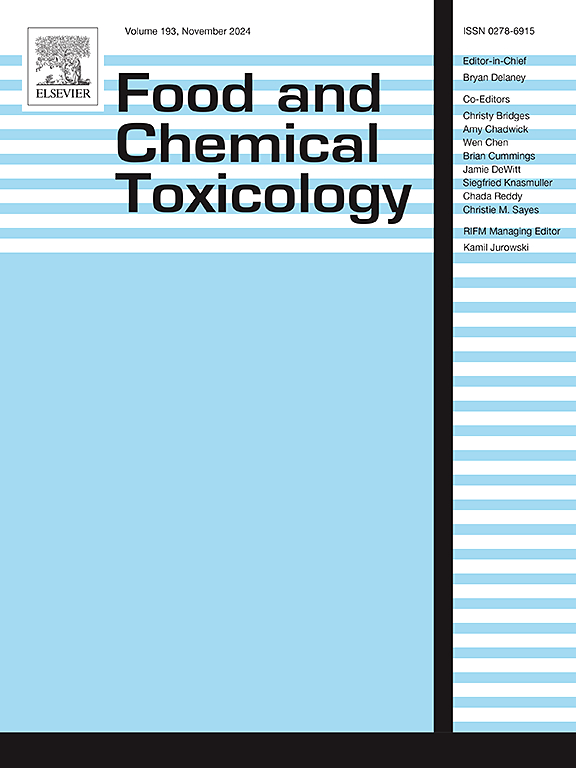Polysaccharides extracted from Polygonatum sibiricum alleviate intestine-liver-kidney axis injury induced by citrinin and alcohol co-exposure in mice
IF 3.9
3区 医学
Q2 FOOD SCIENCE & TECHNOLOGY
引用次数: 0
Abstract
Citrinin (Cit) is a metabolite of Monascus Aspergillus that is known to be nephrotoxic and affects the safety of Monascus products. Here, we investigated the effects of an intervention with bioactive Polygonatum sibiricum polysaccharides (PSPS) on Cit-induced toxic damage in populations with dietary patterns characterized by alcohol consumption. Our results showed that the PSPS intervention significantly increased the levels of intestinal Cit and its metabolite M1. Additionally, the PSPS intervention mitigated intestinal damage, as well as liver and kidney stress, and flora disruption induced by combined exposure to Cit and alcohol. It also promoted the recovery of Lactobacillus abundance. However, there was no significant improvement in hippocampal damage. Metabolomics analysis indicated that the PSPS significantly influenced the metabolic pathways involved in energy metabolism in liver and kidney, such as aspartic acid and tyrosine metabolism. Correlation analysis revealed a significant relationship between the reduction of Cit metabolites and the differential metabolites in the liver and kidney. Our results demonstrated that the PSPS intervention showed promise in improving intestinal flora imbalances, enhancing the barrier function against Cit, alleviating intestinal, liver, and kidney damage, and addressing the metabolic disorders along the gut-liver-kidney axis resulting from the co-exposure to Cit and alcohol.
求助全文
约1分钟内获得全文
求助全文
来源期刊

Food and Chemical Toxicology
工程技术-毒理学
CiteScore
10.90
自引率
4.70%
发文量
651
审稿时长
31 days
期刊介绍:
Food and Chemical Toxicology (FCT), an internationally renowned journal, that publishes original research articles and reviews on toxic effects, in animals and humans, of natural or synthetic chemicals occurring in the human environment with particular emphasis on food, drugs, and chemicals, including agricultural and industrial safety, and consumer product safety. Areas such as safety evaluation of novel foods and ingredients, biotechnologically-derived products, and nanomaterials are included in the scope of the journal. FCT also encourages submission of papers on inter-relationships between nutrition and toxicology and on in vitro techniques, particularly those fostering the 3 Rs.
The principal aim of the journal is to publish high impact, scholarly work and to serve as a multidisciplinary forum for research in toxicology. Papers submitted will be judged on the basis of scientific originality and contribution to the field, quality and subject matter. Studies should address at least one of the following:
-Adverse physiological/biochemical, or pathological changes induced by specific defined substances
-New techniques for assessing potential toxicity, including molecular biology
-Mechanisms underlying toxic phenomena
-Toxicological examinations of specific chemicals or consumer products, both those showing adverse effects and those demonstrating safety, that meet current standards of scientific acceptability.
Authors must clearly and briefly identify what novel toxic effect (s) or toxic mechanism (s) of the chemical are being reported and what their significance is in the abstract. Furthermore, sufficient doses should be included in order to provide information on NOAEL/LOAEL values.
 求助内容:
求助内容: 应助结果提醒方式:
应助结果提醒方式:


